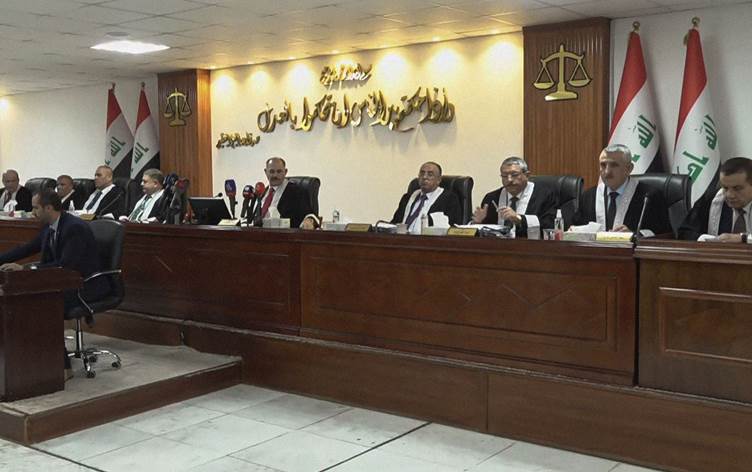
The Iraqi Federal Supreme Court session on May 30, 2023, during which the self-extension of the Kurdistan Region's parliament was ruled "unconstitutional." Photo: Rudaw
ERBIL, Kurdistan Region - The Iraqi Federal Supreme Court on Tuesday ruled against the self-extension of the Kurdistan Region’s parliament by another year, calling it “unconstitutional” and declaring that the term of the legislature has finished.
“The Federal Supreme Court ruled … that the law to extend the fifth term of the Kurdistan Iraq parliament is unconstitutional,” the court said during the hearing on Tuesday.
It also declared “the fifth term of the Kurdistan parliament has ended with the end of the legal period specified for it.”
Members of the Kurdistan Region’s parliament in October of last year voted by a majority to extend the four-year term of the legislature by one year, after disagreements between the blocs over the current elections law prevented new elections from materializing.
The decision to declare the self-extension of the Region’s parliament as “unconstitutional” was taken after the hearing was previously adjourned four times.
“The federal court considered everything issued by the Kurdistan parliament after that legal period invalid from the constitutional point of view,” the court added.
"This decision is final and binding by all authorities, and it was taken by a majority vote."
The case was filed against Speaker of the Kurdistan Region’s parliament, Rewaz Fayaq, by New Generation Movement (NGM) head Shaswar Abulwahid, NGM MP in the Iraqi parliament Srwa Abdulwahid, NGM MP in the Kurdish parliament Kawa Abdulqadir, and former Speaker of the Kurdish Parliament Yousif Mohammed.
The plaintiffs called for annulling the extension, saying that the decision contradicts Articles 5 and 20 of the Iraqi constitution - which emphasize the right of the Iraqi people to vote and participate in the democratic process - as well as Article 51 of the Kurdistan Region parliament’s election law - which stipulates that a parliament term must not exceed four years.
In late March, the Kurdistan Region’s presidency announced that parliamentary elections will be held on November 18 after being delayed by a year.
The Iraqi top court’s decision comes amid an ongoing row regarding the federal budget bill between Iraqi and Kurdish parties in the Iraqi parliament after changes were made by the legislature’s finance committee about two articles that relate to the Kurdistan Region. The changes prompted the Kurdistan Regional Government (KRG) to slam the amendments as “unconstitutional,” labeling them a violation of agreements previously agreed upon by Erbil and Baghdad.
The inability of the Kurdistan Region to hold elections is largely attributed to contentions and ongoing wrangling between the Region’s ruling parties - the Kurdistan Democratic Party (KDP) and the Patriotic Union of Kurdistan (PUK) - who have often found themselves entangled in a clash of words over the elections law, as the Sulaimani-based PUK has said it would support new polls once the electoral law has been amended.
KRG authorities have come under mounting criticism domestically and on an international level for failing to hold elections on time.
Rebwar Babkayi, a KDP MP, claimed in late March that the legislature extended its term based on political and institutional necessity, and in order to prevent the Kurdistan Region from “falling into a legal vacuum.”








Comments
Rudaw moderates all comments submitted on our website. We welcome comments which are relevant to the article and encourage further discussion about the issues that matter to you. We also welcome constructive criticism about Rudaw.
To be approved for publication, however, your comments must meet our community guidelines.
We will not tolerate the following: profanity, threats, personal attacks, vulgarity, abuse (such as sexism, racism, homophobia or xenophobia), or commercial or personal promotion.
Comments that do not meet our guidelines will be rejected. Comments are not edited – they are either approved or rejected.
Post a comment